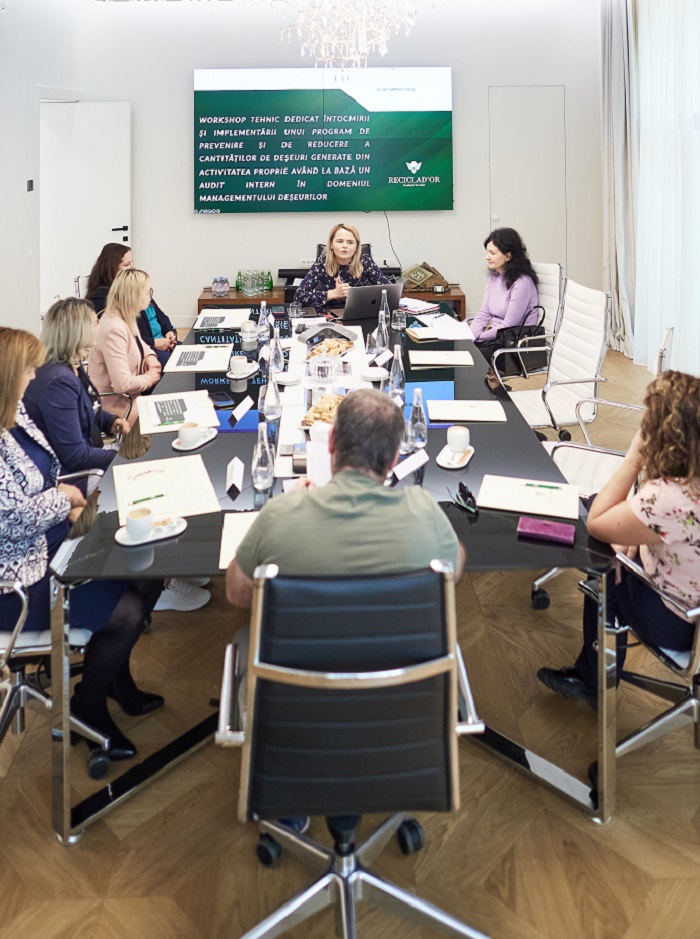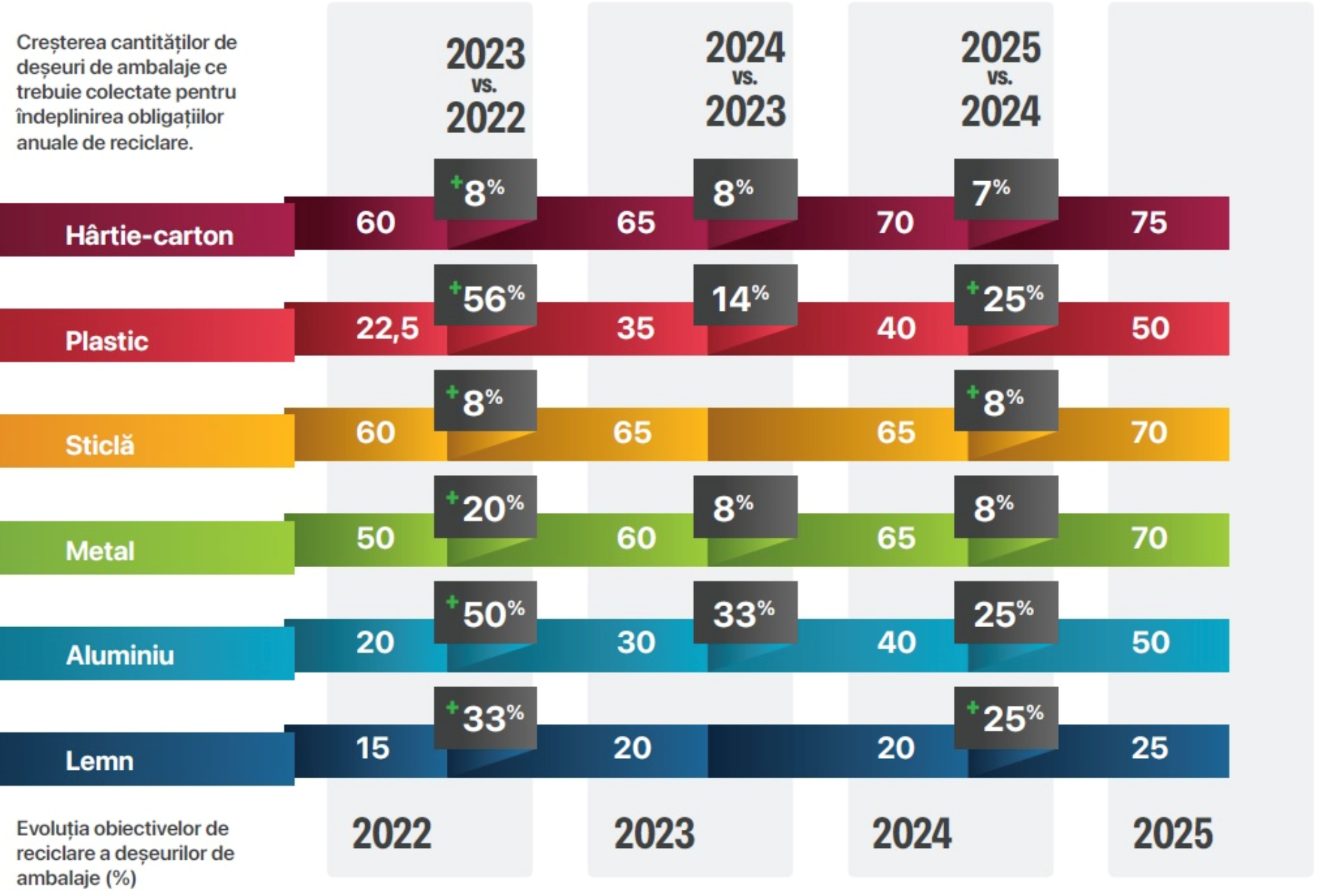- Marius Brînzea, Reciclad`OR : “Over the next three years, packaging recycling targets will increase exponentially”
Interview with Marius Brînzea, Strategy Director Reciclad`OR, about the change of gear in the revision of the Packaging and Packaging Waste Directive.
How do you see the evolution of packaging and packaging waste management in the medium term?
In the coming years, we will see a major transformation of packaging and packaging waste management in the European Union. In order to understand the magnitude of these transformations, we will first need to understand the dynamics at the regulatory level, as we are talking about a highly regulated activity.
The Action Plan for the Circular Economy already announced the rewriting of all existing rules to move to a circular supply chain. The fundamental objective being that all packaging placed on the EU market should be reused or recycled in an economically viable way by 2030. These regulations will test the sustainability of packaging solutions to the maximum. Achieving such a goal requires the revision of a number of directives in order to ensure an appropriate and uniform legal framework across the Union. The process of revising European legislation is currently underway.
Reciclad’OR is closely monitoring and analyzing recently adopted or pending legal regulations that have a medium to long-term economic and operational impact. We are particularly concerned with the European Parliament and Council Regulation on packaging and packaging waste, amending Regulation (EU) 2019/1020 and repealing Directive 94/62/EC.
I will not go into the details of the draft that is circulating among professional associations and European authorities, but I will say that this document should be read very carefully. From the perspective of the medium- and long-term impact, however, I would like to draw attention to the change of gear in terms of the revision of the Packaging and Packaging Waste Directive. The regulatory difficulties of the current directive at European level, in particular the essential requirements for packaging, have highlighted the fact that harmonization of legislation at EU level needs to be achieved in the form of a regulation, rather than by revising the current directive.
The adoption of a regulation is supported by some business constituents. They stress the need for harmonized rules across the Union and framed in a regulation. With this regulation the European Union ensures that obligations are implemented at the same time and in the same way in all 27 Member States. The same requirements for all market players will provide the necessary legal certainty, reduce distortions of competition. It also sends clear signals to actors outside the European Union who place packaged products on the EU market. In addition, the Commission will be mandated to develop implementing measures and further improve the Regulation (where necessary), allowing common rules to be established quickly.
What does this mean in concrete terms?
If the revision of the Directive went through the arduous process of consultation in Member States’ parliaments and then had to be transposed into national legislation (in the form of a law or government decision), a Regulation is implemented as adopted, it has the force of law and avoids possible faulty implementation.
Another important document we focus on is the Guidelines for the collection and reporting of data on packaging and packaging waste under Decision 2005/270/EC. This guide provides guidance to Member States on fulfilling their reporting obligations under Council Directive 94/62/EC in line with the reporting requirements of Commission Decision 2005/270/EC. The guide provides detailed guidance on preparing data for reporting, completing the reporting tables, completing the quality report and correctly identifying the recycling calculation points for each packaging material. You can read the guide in full on the Recycle Now legislation website.
With regard to the correct identification of the calculation points for the recycling of each packaging material, I think it is an opportune moment to move on to the recent changes in national legislation.
In September, a piece of legislation with a major impact on the packaging and packaging waste supply chain was adopted: Emergency Ordinance No 125/2022 amending and supplementing Government Emergency Ordinance No 196/2005 on the Environment Fund.
The ordinance brings with it a number of major changes, among which I mention:
- Split responsibilities in the supply chain between producers, organizations implementing extended producer responsibility (OIREP) and waste collectors.
- Establish guarantees applied to packaging waste collectors working directly with OIREPs.
- Change the calculation point for packaging recycling.
When referring to the calculation point for the recycling of packaging, GEO 125/2022 presents a general (and non-specific) phrase “actually recovered or incinerated”. Such general wording does not correlate with the Implementing Decision (EU) 665/2019 amending Decision 2005/270/EC establishing the relevant tables of the database system pursuant to Directive 94/62/EC of the European Parliament and of the Council on packaging and packaging waste.
One only has to look at the EU guidelines to understand the difficulties that a generalist approach to the calculation point for packaging recycling could create.
However, we hope that this approach will be corrected in the process of transforming the Emergency Ordinance into law.
This type of situation often encountered at Member State level has created the prerequisites for a strong and legally binding EU regulation to align practices at European level and avoid any errors in the implementation process.

What are the immediate challenges for the Romanian industry?
The end of 2022 marks the end of a long period of constant recycling targets. Starting in 2023, three years in a row, recycling targets will see exponential increases. And not just recycling targets by material type but also overall recovery and recycling targets.
Increasing recycling targets requires increasing waste collection rates, i.e. collecting more packaging waste.

For example: 54% more plastic packaging waste will need to be collected in 2023 compared to 2022 to meet the recycling targets for plastic packaging. To meet the recycling targets in 2025 we would need to collect 97% more plastic packaging waste compared to what we collect in 2022.
And when it comes to plastic packaging, we must not omit the provisions of the Single Use Plastic Directive.
At the same time, the overall recovery target will increase from 60% in 2022 to 70% in 2025. This means additional quantities of packaging waste to be collected and recycled.
Are we aware of this major leap? What impact will these changes have?
The current national context, in many ways, is not favorable. Without falling into the trap of generalization, we are currently facing poor performance of some of the separate collection systems managed by local authorities (ADI/UAT). The main causes are inadequate infrastructure and poor operation.
Global developments have also manifested themselves in waste management through increased operating costs (collection, sorting, storage, etc.) due to rising energy and fuel prices.
If we add to this the forecast legislative changes at EU level we can undoubtedly say that in the next three years the sustainability of packaging and packaging waste management in Romania will be really tested. The economic and operational impact will be significant and at times unpredictable.
Is the Romanian industry ready for such a development?
Today all national and multinational companies are constantly concerned about future developments in packaging and packaging waste management.
These developments directly impact their performance and competitiveness as well as the sustainability of their packaging solutions. Companies are not only anticipating the future but are also allocating significant resources and skills to the development of packaging management in Romania. The effort to implement the Return Guarantee System is just one example.
In parallel with improving waste management systems, these companies allocate significant budgets to programs and campaigns to educate and inform consumers about separate collection, recyclability and sustainability of packaging solutions. And these budgets are not to be underestimated.
How does Reciclad’OR support its partners in managing the medium and long-term challenges in the transition to a Circular Economy?
The main objective of our work is to safely fulfil the recycling obligations for all our partners. We have taken responsibility for the recycling of packaging for more than 800 companies and have fully met our legal obligations in all five years of operation. This is attested to by annual checks by state authorities.

In the last two years we have faced unforeseen situations in all aspects of daily life, globally or nationally. Crisis situations have become a constant feature of our existence, and we will have to learn to manage them efficiently and effectively. Predictability in our work and in our relationship with our partners is another major challenge for Recyclad`OR. Through rigorous strategic planning, a comprehensive risk management system, early warning mechanisms and substantial back-ups we have managed to absorb market shocks and turbulence in 2022 without passing them on to our partners. We have thus ensured predictability and stability of packaging recycling rates for our partners throughout the year. Just as we have done since our inception until today. The transition to a circular economy requires a lot of expertise to improve or innovate business models.
Regulations adopted at European level are putting pressure on packaging solutions and consequently our whole vision is connected to the future of packaging solutions.
Innovation and continuous diversification of the service portfolio is one of Reciclad’OR’s development directions. By providing access to a mix of services and solutions we want to ensure our partners the freedom to choose the most efficient and sustainable packaging solutions in full compliance with EU requirements.

Reciclad’OR has constantly invested in diversifying and increasing the quality of the company’s resources and skills. We provide technical and legislative consultancy services in packaging management, data reporting support services, thematic workshops (legislation, collection models, packaging recyclability, waste prevention, RGS, etc.) and training dedicated to the circular economy.
Since 2021, we have enjoyed the presence of hundreds of participants from dozens of partner companies at the Circular Economy Trainings. The training has been a real success, as witnessed by the public testimonials of participants on the Reciclad’OR website.
We have always been forward-looking and knowledge-oriented. That’s why we are constantly involved in the international work we do in the most important global organizations: the International Solid Waste Association (ISWA) and the Prevent Waste Alliance. We transfer all our international expertise free of charge to all our partners in an applied and business model-specific way.

Sursa: revista-piata.ro





